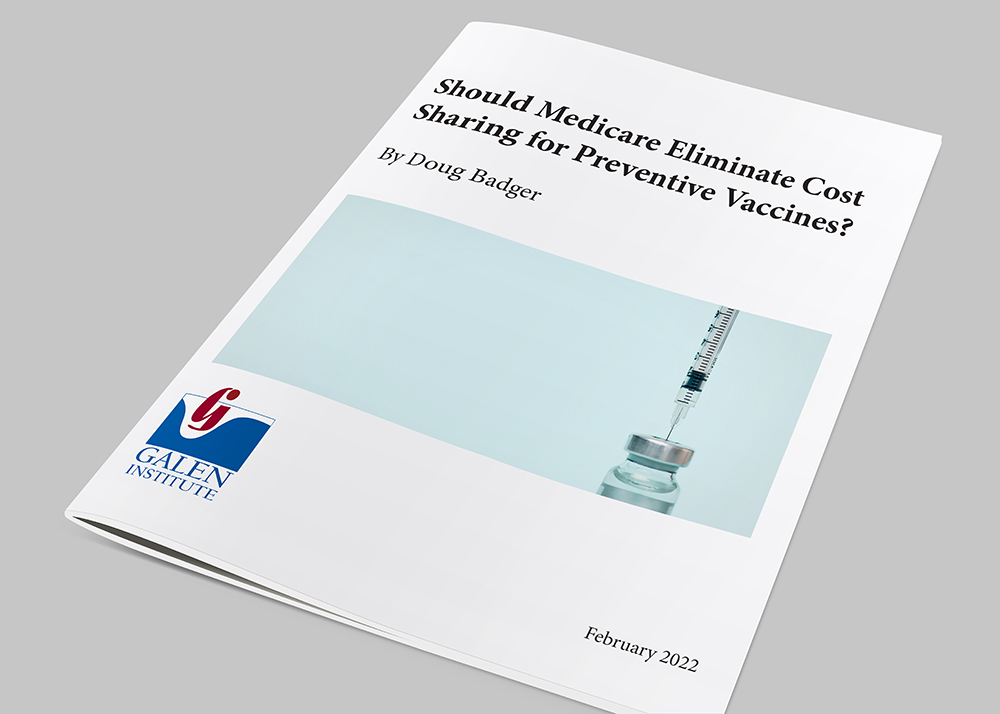While Covid-19 vaccines have been “free” to everyone, Medicare’s overall vaccine policy is haphazard at best. In a new paper, Galen Senior Fellow Doug Badger examines Medicare’s “balkanized” coverage of preventive vaccines.
He asks: “Should Medicare Eliminate Cost Sharing for Preventive Vaccines?”
Badger explains the current confusion: “Medicare Part B covers some preventive vaccines, while Part D covers others. Beneficiaries are not responsible for cost sharing for Part B vaccines. Most Part D plans require cost sharing, with amounts varying by plan and product.”
The key issue—and obstacle—is a patient’s cost-sharing responsibility. In his paper, Badger examines the pros and cons of eliminating cost sharing for preventive vaccines.
“Cost-sharing requirements are among the factors that affect vaccine uptake,” he writes. “Since seniors are generally more susceptible to severe illness from vaccine-preventable diseases, it has been proposed that Medicare make preventive vaccines free at the point of service.
“This policy would increase immunization rates, thereby diminishing the risk of serious disease among beneficiaries and reducing the amount the program spends to treat preventable diseases. On balance, such proposals would increase Medicare spending, but experts disagree over the size of the increase and the extent to which the added costs would be offset by reducing the incidence of illness that vaccines prevent,” he writes.
Medicare’s haphazard policy does often discourage uptake. “A 64-year-old with employer-sponsored private insurance can get free shingles vaccines, but a 65-year-old on Medicare may have to pay more than $350 for a two-dose course,” Badger explains.
Vaccines are different from general medical care where insurers use cost sharing to discourage excessive and inappropriate utilization and steer beneficiaries to more efficient providers.
“MedPAC examined take-up rates for vaccinations between pneumococcal vaccines—which are free to beneficiaries under Part B—and shingles vaccines, which require copayments under Part D,” Badger writes.
“It found that 59% of seniors had received the pneumococcal vaccine in 2017 or earlier. By contrast, only 32% of beneficiaries received shingles shots between 2010 and 2018. In 2018, just 4% of beneficiaries got shingles shots.”
Requiring Medicare beneficiaries to have “skin in the game” for vaccinations makes little sense. “There is little risk that patients will over-vaccinate. Pharmacists, doctors and other providers generally adhere to CDC recommendations in administering vaccines. Medicare only covers vaccines that are consistent with these recommendations. Once a beneficiary gets two doses of the shingles vaccine, the course is completed. Medicare wouldn’t cover a third dose unless CDC revises its recommended vaccine schedule.
“Medicare’s cost-sharing requirements thus do not discourage overuse but do discourage appropriate use of preventive vaccines.”
Badger examines two policies under consideration to make Medicare vaccine policy more coherent: Eliminate Medicare Part D cost sharing for preventive vaccines, or cover the vaccines under Part B, rather than Part D.
“Eliminating cost sharing for preventive vaccines would reduce the incidence of serious illness caused by diseases that vaccines prevent. While that would be a better outcome for beneficiaries, it would produce a net increase in Medicare spending.
“Given the perilous state of Medicare financing, any expansion of coverage of preventive vaccines should include broader Medicare reform provisions to offset those costs,” he concludes.

